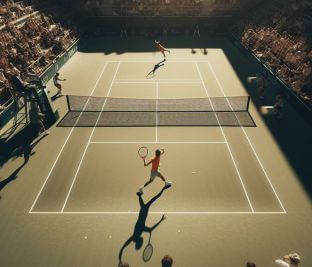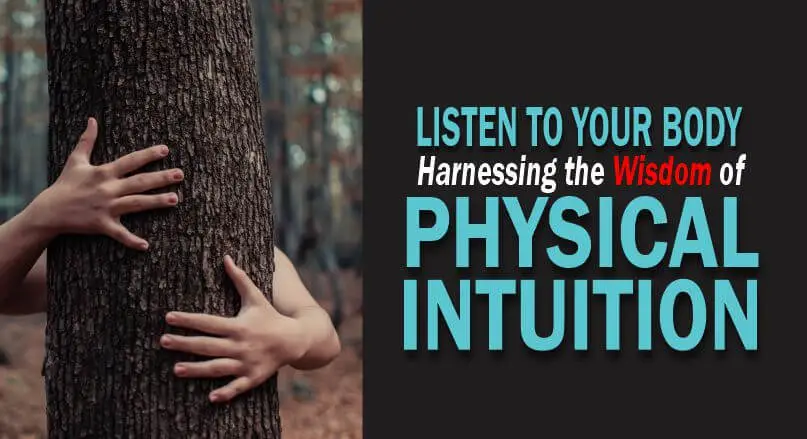Last updated on June 8th, 2025 at 12:19 pm
Learn how to develop your physical intuition and body intelligence for improved decision-making, confidence, and self-awareness.
Physical intuition and body Intelligence are terms that describe the innate understanding and awareness of our body and its movements against the physical world.
These two phrases are interchangeable and express our ability to listen to the signals our body sends us, allowing us to move with grace and ease.
Unlike other types of intuition, which are often associated with the mind, physical intuition and body intelligence rely on the body as its primary source of information
They enable us to navigate through space, adjust our posture, and perform complex physical tasks without conscious effort.
Developing physical intuition and body intelligence can lead to improved physical performance and clarity in understanding our physical world.
In this guide, we will discuss how they work, the benefits, and how to develop them.
Recommended: What is Sensory Perception?
Table of Contents
- What are Body Intelligence and Physical Intuition?
- Development of Body Intelligence and Physical Intuition
- Body Intelligence and Physical Intuition in Scientific Discovery
- How Body Intelligence and Physical Intuition Differ from Other Types of Intuition
- How Physical Intuition Works
- Physical Intuition and Body Intelligence in Everyday Life
- Examples of Body Intelligence
- The Benefits of Developing Body Intelligence
- How to Develop Physical Intuition
- Common Obstacles to Developing Body Intelligence
- Consequences of Ignoring Body Intelligence and Physical Intuition
- Limitations of Physical Intuition
- Conclusion
- Frequently Asked Questions
What are Body Intelligence and Physical Intuition?
What is Physical Intuition?
Physical intuition refers to the innate ability of human beings to understand and make sense of the physical world around them.
It is the ability to sense and interpret physical sensations in the body and to use that information to guide decision-making and behaviour.
Also, it is a form of intuitive knowing that arises from bodily awareness and sensitivity, rather than from rational analysis or logical thinking.
Being a powerful tool for self-knowledge, it helps you to understand your environment, properties of objects and how they behave without analytical thoughts.
It is not limited to physical sensations, as it can also include emotional and energetic cues that are felt in the body.
Related: Claircognizance: The Intuitive Knowing
What is Body Intelligence?
Body intelligence is the subconscious understanding that allows you to comprehend and predict the outcomes of physical phenomena without relying on explicit calculations or formal knowledge.
For example, knowing how many footsteps will take you to a particular point, or how far you can stretch your leg to cross an open gutter.
Also known as somatic intelligence, it is the innate understanding of your body and its interactions with the environment.
Body intelligence encourages self-awareness, coordination, and emotional resilience, playing a crucial role in physical well-being, performance, and interpersonal interactions.
Related: Fundamentals of Extrasensory Perception
Development of Body Intelligence and Physical Intuition
While physical intuition and body intelligence are innate human traits, they can also be developed and honed through education and practice.
In childhood, we learn through trial and error, exploring our physical environment and gradually building an intuitive understanding of how objects behave.
As we grow older, our experiences and formal education further refine and expand our intuitive understanding of the physical world.
This development is not limited to scientists or professionals; even individuals who do not possess advanced scientific knowledge can develop their physical intuition through hands-on experiences and a curious mindset.
Related: Sensing vs Intuition
Body Intelligence and Physical Intuition in Scientific Discovery
Body intelligence and physical intuition play a vital role in scientific discovery.
They allow scientists to formulate hypotheses, design experiments, and make predictions about the physical phenomena they study.
For example, Isaac Newton’s physical intuition about the gravitational force paved the way for his groundbreaking laws of motion.
Albert Einstein’s intuitive insights about relativity revolutionized our understanding of space, time, and the nature of the universe.
These scientific geniuses did not solely rely on explicit calculations or formulas; their physical intuition and body intelligence guided them towards these discoveries.
Recommended: Signs You Are Not Paying Attention to Your Intuition
How Body Intelligence and Physical Intuition Differ from Other Types of Intuition
Unlike other types of intuition, which may involve gut feelings or instincts, being physically intuitive is grounded in knowledge gained through practical experience and scientific understanding.
It relies on a deep understanding of the laws of physics and how they apply to the world around us as regards to the body.
For example, a physicist with strong physical intuition can accurately predict the behavior of an object in motion or the way that different substances will react under different conditions.
Other types of intuition, such as emotional or spiritual intuition, may rely more on personal feelings or insights that are difficult to explain or verify through objective means.
Related; Why Women’s Intuition Is More Powerful Than That Of Men
Recommended: Why Emotional Intuition Matters: Making Better Decisions
Related: What is Extraverted Intuition and How Do You Cultivate it?
How Physical Intuition Works

The practice involves focusing on the physical sensations and bodily awareness within you, including tension, discomfort, ease, pleasure, body temperature, heartbeat, and breathing patterns.
Your body is highly attuned to the environment and people around you, providing valuable information for decision-making.
Developing this skill enhances your ability to interpret bodily sensations, such as those related to food, exercise, stress, and interpersonal interactions.
By tuning into these sensations, you gain insight into situations and can respond authentically and effectively.
This bodily intuition can guide your choices for better health and well-being, as well as your interactions with others.
Physical Intuition and Body Intelligence in Everyday Life

Body intelligence and its cousin occur not only in scientific endeavors but also in our everyday lives.
From catching a ball to driving a car, we rely on our intuitive understanding of the laws that govern motion and spatial relationships.
When we throw an object, our subconscious mind calculates the speed, angle, and trajectory required to hit a specific target.
We do not explicitly calculate these factors or use complex mathematical formulas, but our intuition guides us flawlessly.
Physical Intuition and Body Intelligence in Sports and Athletics
These human phenomena also play a significant role in the world of sports and athletics.
Elite athletes excel not only because of their physical prowess but also due to their highly developed physical intuition.
A basketball player, for instance, effortlessly calculates the speed, trajectory, and motion of the ball to make successful shots or passes.
A baseball player relies on their intuitive understanding of the laws of physics to judge the movement of a pitched ball and swing with precision.
This practice engages both the body and physical senses, gauging length and required force needed.
These athletes have trained their somatic intuition through countless hours of practice, allowing them to make split-second decisions that seem almost instinctive.
Physical Intuition and Body Intelligence in Artistic Creativity
They are not limited to scientific or athletic endeavours; it also influences artistic creativity.
Painters, sculptors, and dancers often rely on their intuitive understanding of the physical world to create aesthetically pleasing and emotionally evocative works.
A painter’s intuitive knowledge of colour theory and composition guides his brushstrokes and choice of palette.
A dancer’s intuitive understanding of body mechanics and movement allows them to portray emotions and tell stories through their art.
Physical intuition and body intelligence give artists a deep understanding of their chosen medium, allowing them to push boundaries and create innovative works.
Examples of Body Intelligence

- Kinesthetic sense: The ability to sense and control the movement and position of one’s body and limbs.
- Tactile sense: The ability to sense and interpret information through touch, such as the texture, temperature, and pressure of objects.
- Proprioception: The ability to sense the position, orientation, and movement of one’s body in space, even without visual cues.
- Intuitive reactions: The ability to react quickly and instinctively to physical situations, such as catching a falling object or avoiding an obstacle.
- An intuitive understanding of the physical world can be honed and developed through practice and experience, such as in activities like sports, dance, or martial arts.
- It can also be used in problem-solving and decision-making, as the body can sometimes provide insights or solutions that the mind cannot.
Related: How to Improve your Intuition (22 Ways)
The Benefits of Developing Body Intelligence

1. Improved Decision Making
Developing body intelligence enhances decision-making by attuning you to physical sensations and bodily awareness.
This allows you to make choices that support your health, well-being, and success.
Your body collects information from the environment through the senses, aiding in informed decisions.
This intuition helps you discern nourishing foods, exercise, and navigate interpersonal situations by reading body language and sensing energy, leading to authentic and effective responses.
Related: How And Reasons Why The Best Leaders Rely On Their Intuition
2. Increased Confidence
Strong intuition on the physical level leads to increased confidence in your abilities.
Understanding how the body moves and interacts with the environment encourages a sense of control and confidence in performing physical tasks.
For example, dancers and athletes with developed physical awareness exhibit increased confidence in their abilities, allowing them to perform at their best.
3. Greater Self-awareness
Developing body intelligence encourages greater self-awareness.
Individuals tuned to their bodies are more aware of their physical sensations, limitations, and strengths.
For example, yoga practitioners and martial artists with strong body intelligence detect imbalances, anticipate movements, and stay safe.
This intuitive understanding promotes mindfulness, and connection with the body, and benefits various activities.
Related: The Role of Cognitive Intuition in Creative Thinking
4. Better Physical Health
Body intelligence contributes to better physical health by promoting engagement in activities that support overall well-being.
For instance, a runner with developed physical awareness can adjust training based on bodily signals.
They can also detect imbalances and address weaknesses, benefiting various activities and promoting mindfulness and well-being.
Related: Dangers Of Trusting Your Gut

How to Develop Physical Intuition
Developing body intelligence skills requires practice, patience, and a willingness to slow down, pay attention and listen to your body.
This can be challenging in a world that often prioritizes speed and productivity over self-awareness and introspection.
Here are the proven ways to develop it:
1. Tune in to Physical Intuition
Here are some techniques that can help you become more attuned to your body’s sensations:
- Body Scan: Lie down, focus on breathing, then gradually scan the body for sensations and check for tension or discomfort.
- Mindful Movement: Engage in gentle practices like yoga, tai chi, or qigong to heighten body awareness.
- Sensory Awareness: Be mindful of textures, temperatures, and pressures to enhance sensory awareness.
- Visualization: Use visualization to connect with your body, imagining energy flowing through it.
- Breath Awareness: Use the breath to draw in energy and release tension.
Also Read: 14 Reliable Books On Intuition To Energize Your Life
2. Mindfulness and Meditation
Mindfulness and meditation can play a significant role in developing intuition, including physical intuition.
Here are some ways that mindfulness and meditation can help with body intelligence:
- Mindfulness and meditation foster awareness of thoughts, emotions, and bodily sensations, aiding in recognizing patterns and insights for greater intuition.
- These practices quiet the mind, making it more receptive to intuitive insights by reducing mental clutter.
- They facilitate access to the subconscious, where intuition often originates.
- Regular practice helps develop intuition as a skill, enhancing the recognition and trust of intuitive insights.
- Mindfulness and meditation foster greater empathy for oneself and others, aiding in the understanding and interpretation of intuitive insights.
3. Regular Physical Activity
Regular physical activity is crucial for developing body intelligence.
Regular physical activity can help you become more familiar with your body and its capabilities.
- Developing Muscle Memory: Regular physical activity aids in developing muscle memory, making movements more automatic and efficient, allowing focus on other performance aspects.
- Improving Coordination: Physical activity enhances coordination and balance, crucial for physical intuition, leading to more efficient and controlled movement.
- Increasing Body Awareness: Regular activity enhances body awareness, deepening understanding of capabilities and limitations for greater physical intuition.
- Enhancing Focus: Physical activity improves focus and concentration, enabling better tuning into body sensations and movements for self-improvement and identifying strengths.
4. Being in Nature
Here are some of how nature can help:
- Sensory Stimulation: Nature offers diverse sensory experiences, enhancing understanding of the physical world. For instance, walking barefoot on different terrains improves balance and coordination.
- Improved Focus: Nature enhances focus and attention, encouraging greater awareness of the body’s sensations and needs.
- Reduced Stress: Time in nature reduces stress and promotes relaxation, heightening receptiveness to bodily sensations.
- Increased Creativity: Nature stimulates creativity and skill development, fostering attunement to the body and its movements.
- Connection with the Natural World: Nature sustains a deeper connection with the natural world, promoting empathy and attunement to one’s own and others’ needs.
Common Obstacles to Developing Body Intelligence
1. Ignoring Bodily Sensations
Ignoring bodily sensations hinders the development of body awareness and body intelligence.
It leads to a lack of awareness, inefficient movements, increased risk of injury, and missed opportunities for growth and development.
Tuning into bodily sensations is crucial for understanding and improving physical intuition.
2. Overthinking and Rationalizing
Overthinking and rationalizing hinder the development of body intelligence by inhibiting intuition, ignoring physical feedback, creating fear and doubt, and limiting spontaneity.
These tendencies can limit the opportunities to practice and develop an intuitive body in real-world situations.
3. Distracting Habits and Addictions
Distracting habits and addictions can disrupt body awareness, reduce energy and vitality, create dependence, and affect mental and emotional well-being, hindering the development of physical intelligence.
These challenges can limit the ability to tune in to the body’s needs and respond to its sensations.
4. Difficulty Trusting Oneself
Difficulty trusting oneself can hinder the development of body intelligence by inhibiting intuition, ignoring physical feedback, creating fear and doubt, and leading to a lack of self-confidence.
This can limit the ability to tune in to the body’s needs and respond to its sensations, hindering the development of a strong intuitive body.
Consequences of Ignoring Body Intelligence and Physical Intuition
Ignoring body intelligence and physical intuition can have several significant consequences.
- Ignoring the body’s intelligence leads to a disconnection between the mind and body, causing physical discomfort, stress, and a decrease in overall well-being.
- Ignoring the body’s signals can result in overlooked health issues, leading to delayed diagnosis and potentially more severe health problems.
- Ignoring body intelligence leads to chronic stress, burnout, and a weakened immune system, negatively impacting mental health, productivity, and quality of life.
- Disregarding the wisdom embedded in our bodies can lead to poor decision-making based solely on rational thinking or external influences, missing important insights.
- Ignoring the body’s emotional intelligence can cause emotional repression and disconnection, leading to physical tension, psychosomatic illnesses, and difficulty in building healthy relationships.
Limitations of Physical Intuition
While body intelligence can be a valuable tool for improving physical health, well-being, and athletic performance, it does have some limitations.
Here are some of its limitations:
- Limited to Familiar Activities: It is typically most accurate when applied to activities that you are familiar with. It may be less reliable in unfamiliar or new situations.
- Not Always Accurate: It is not infallible and may be influenced by external factors such as stress, fatigue, or distractions. It is important to validate intuition with objective feedback and not rely solely on intuition.
- Can be Subjective: It is based on your internal experiences and may be influenced by personal biases and perceptions. It is important to be aware of these biases and seek objective feedback.
- Not a Substitute for Technical Skill: While body intelligence can enhance performance, it should not be relied upon as a substitute for technical skill or training. Technical skills are still necessary for optimal performance.
- Can be Overridden by Emotions: Strong emotions such as fear, anger, or excitement can override body intelligence, leading to poor decisions or actions.
- Not Suitable for All Activities: It may not be appropriate or effective for all activities, such as those that require precise measurements or calculations.
Conclusion
Physical intuition and body intelligence are important aspects of human experience, cover the innate ability to interpret bodily sensations, movements, and needs.
Cultivating these qualities offers numerous benefits, including enhanced well-being, improved decision-making, and greater emotional balance.
By developing body awareness, trusting your instincts, and honoring the wisdom of your body, you tap into a deeper understanding of yourself and the world around you, leading to a more harmonious and fulfilling life.
Frequently Asked Questions
What is physical intuition?
It is the ability to tune into bodily sensations and use them to make more informed decisions about physical health and well-being.
How can I develop physical intuition?
It can be developed through mindfulness, physical activity, spending time in nature, and practicing sensory awareness.
How can I enhance my body intelligence?
You can enhance body intelligence through practices such as mindfulness, movement-based activities, somatic exercises, and paying attention to bodily sensations.
What are the benefits of developing body intelligence?
Developing body intelligence can lead to improved physical well-being, better decision-making, heightened self-awareness, and a deeper understanding of emotional and physical needs.
REFERENCES
- Physical Intuitiveness from Physics Experience
- Putting Your Physical Intuitiveness to Work
- The Symbolic Basis of Physical Intuition
- https://www.unimedliving.com/living-medicine/living-medicine/the-body-s-intelligence.html
Pyo Merez (PsyD) is a distinguished adolescent and adult psychologist at the forefront of mental health advocacy.
With expertise in cognitive and developmental psychology, focusing on social relationships, cultural contexts, and individual differences, Pyo has dedicated his career to empowering adolescents and adults.
As a sought-after speaker and panelist, Pyo shares invaluable insights on issues affecting young people, contributing to a deeper understanding of mental health and well-being in today's society.


